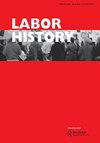工资不平等和经济增长。重新评估弗朗哥主义发展主义对西班牙收入分配的影响
IF 0.7
4区 管理学
Q1 HISTORY
引用次数: 1
摘要
经济发展与不平等之间的关系已被研究人员仔细研究。从库兹涅茨(Kuznets)的开创性工作到皮凯蒂(Piketty)最近的工作,一方面是繁荣周期中的市场力量,另一方面是制度行动,一直被认为是收入分配朝着更平等的社会变化的主要驱动力。以西班牙为例,先前的研究描述了佛朗哥独裁统治期间(1959-1973)批准稳定计划后的增长时期的各种过程。因此,据报道,阿尔凯德发现了发展主义增长模式在减少不平等方面的有限能力,他将其归因于制度限制。相比之下,后来的研究强调了同一时期不平等程度的下降。本文旨在通过研究西班牙经济中最具活力的部门——工业——的工资行为,来研究这一增长周期的影响。具体来说,通过使用国家研究院Estadística编制的工资调查,论文对之前的研究进行了细微的修改,并展示了尽管经济爆炸式增长,但发展主义模式和佛朗哥独裁时期建立的特殊制度框架如何加剧了大多数工业部门的工资分散和收入不平等。本文章由计算机程序翻译,如有差异,请以英文原文为准。
Wage inequality and economic growth. A reassessment of the effects of Francoist developmentalism on income distribution in Spain
ABSTRACT The relationship between economic development and inequality has been closely examined by researchers. From the seminal work of Kuznets to the more recent work of Piketty, market forces in boom cycles, on the one hand, and institutional action, on the other, have been featured as the main drivers of change in income distribution towards more egalitarian societies. In the Spanish case, previous research has described varied processes with regard to the period of growth that followed the approval of the Stabilisation Plan during the Franco dictatorship (1959–1973). Thus, Alcaide reportedly detected a limited capacity of the developmentalist growth model to reduce inequality, which he attributed to institutional limitations. In contrast, later studies have highlighted the decline in inequality during the same period. This paper aims to investigate the effects of this growth cycle by examining the behaviour of wages in the most dynamic sector of the Spanish economy, industry. Specifically, by using the wage survey compiled by the Instituto Nacional de Estadística, the paper nuances previous research and shows how despite explosive growth, the developmentalist model and the peculiar institutional framework built within the Franco dictatorship contributed to increasing wage dispersion and income inequality in most industrial sectors.
求助全文
通过发布文献求助,成功后即可免费获取论文全文。
去求助
来源期刊

Labor History
Multiple-
CiteScore
1.00
自引率
28.60%
发文量
44
期刊介绍:
Labor History is the pre-eminent journal for historical scholarship on labor. It is thoroughly ecumenical in its approach and showcases the work of labor historians, industrial relations scholars, labor economists, political scientists, sociologists, social movement theorists, business scholars and all others who write about labor issues. Labor History is also committed to geographical and chronological breadth. It publishes work on labor in the US and all other areas of the world. It is concerned with questions of labor in every time period, from the eighteenth century to contemporary events. Labor History provides a forum for all labor scholars, thus helping to bind together a large but fragmented area of study. By embracing all disciplines, time frames and locales, Labor History is the flagship journal of the entire field. All research articles published in the journal have undergone rigorous peer review, based on initial editor screening and refereeing by at least two anonymous referees.
 求助内容:
求助内容: 应助结果提醒方式:
应助结果提醒方式:


